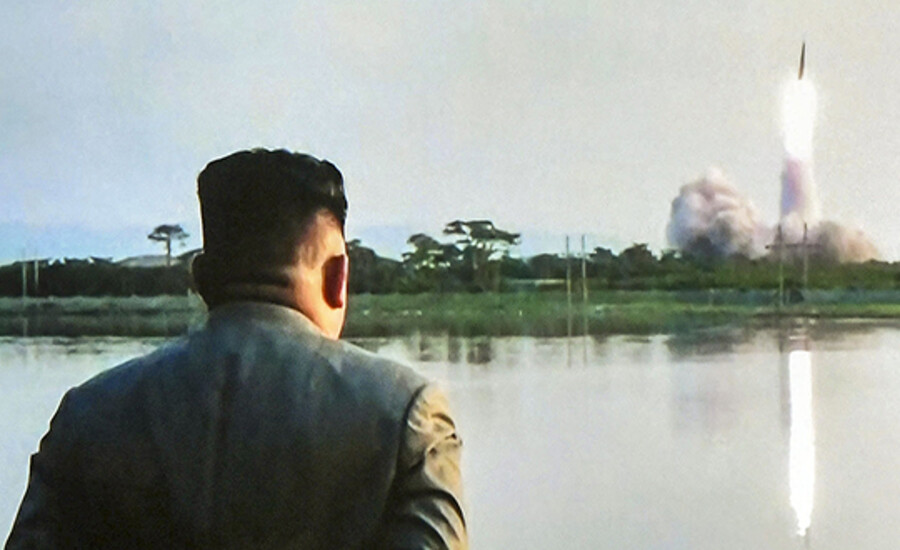
JUNG-YEON JE/AFP/GETTY IMAGES
Why North Korea Is Testing Missiles
North Korea has test-fired at least 20 short-range missiles since May. And though this may appear to be provocative business as usual from the North, a closer look shows a trend underway that could fundamentally resculpt Asia’s security landscape.
The United States has responded to these tests essentially with a shrug. U.S. President Donald Trump characterized the missiles as “smaller ones” and the tests “very standard.” He has emphasized that, unlike the intercontinental ballistic missiles (icbms) North Korea tested early in his presidency, the current models being tested cannot reach the U.S. mainland or many overseas American assets.
President Trump’s downplaying of the recent tests is motivated partly by a desire to preserve his effort to convince North Korean leader Kim Jung-un to denuclearize his military. This has consistently been among Mr. Trump’s highest foreign-policy goals. Achieving it would be a major victory, and would increase his chances of winning a second presidential term.
Abandoned Allies
The trouble with this U.S. approach is that Japan and South Korea are treaty allies of America. Both depend largely on the U.S. for national security and for defending their interests. And both are within range of the highly maneuverable missiles the North is testing.
“This was the worst-case scenario for Tokyo,” Yuki Tatsumi, codirector of the Stimson Center’s East Asia Program, told the Japan Times on August 28. “Trump deals with North Korea, only focusing on its nuclear program and icbms, leaving Japan still exposed to North Korea’s short- and medium-range missiles.”
On August 25, Japanese Prime Minister Shinzō Abe met with President Trump. After the president once again shrugged off the test launches, Abe—normally a staunch Trump supporter—contradicted him. He called the tests “extremely regrettable” and stressed that they violate United Nations resolutions. Many leaders in South Korea are similarly alarmed by the Trump administration’s insouciance over the tests.
This issue could drive a wedge between the U.S. and its Asian allies. This may be precisely what North Korea and its primary allies—China and Russia—are aiming to accomplish.
It is no secret that China and Russia support the North Korean regime: They routinely use their UN veto power to protect it, and even when sanctions are passed against it, they violate them to help the North. This gives China and Russia heavy influence over North Korea’s foreign policy.
It is also no secret that China and Russia share the goal of ousting U.S. power from East Asia, including the presence of some 28,000 U.S. troops in South Korea and some 54,000 in Japan.
North Korea’s short-range missile tests could easily be a calculated effort by China and Russia to weaken America’s alliances with Japan and South Korea. They know President Trump has strong motivation to downplay them, and they know how badly this will worry Japan and South Korea.
South Korea and Japan have been seriously considering expelling U.S. troops. Both have boosted their own military power, partly to make them less reliant on outside help. President Trump has also voiced his displeasure with how much America pays to safeguard Japan and South Korea. Strains were already present in these U.S.-Asian alliances, and each North Korean short-range missile test strikes not only its target, but those strained relationships.
‘A Threat Many Times Greater’
In 2017, when North Korea’s aggression was at a peak, Trumpet editor in chief Gerald Flurry said the world should be more concerned about Russia and China than about North Korea.
This analysis, he explained, was based on Bible prophecy. “The Bible’s prophecies show that, in a sense, the North Korea crisis is a massive distraction from the real threat posed by China and Russia,” he wrote. “These powerful Asian nations are the only reason North Korea is able to operate so freely. And Bible prophecy shows that they pose a threat many times greater than the one from North Korea!” (co-worker letter, Sept. 13, 2017).
The prophecies of which he spoke are recorded mainly in Ezekiel, Daniel and Revelation. They show that Russia will lead a mighty military confederacy, with China in a secondary leadership role. Less powerful Asian countries, such as the Koreas and Japan, will throw their power behind this Russian-led bloc.
When these prophecies are placed alongside prophecies about the soon-coming end of American power, it becomes clear that the days are numbered for America’s alliances with Japan and South Korea.
In his booklet The Prophesied ‘Prince of Russia,’ Mr. Flurry shows that this Asian confederacy will play a key role in the most violent conflict in mankind’s history. But he also shows that these developments are tied to unprecedentedly good news. At the end of this conflict, he writes, Jesus Christ will usher in “a peaceful and prosperous new age for the entire Earth!”
